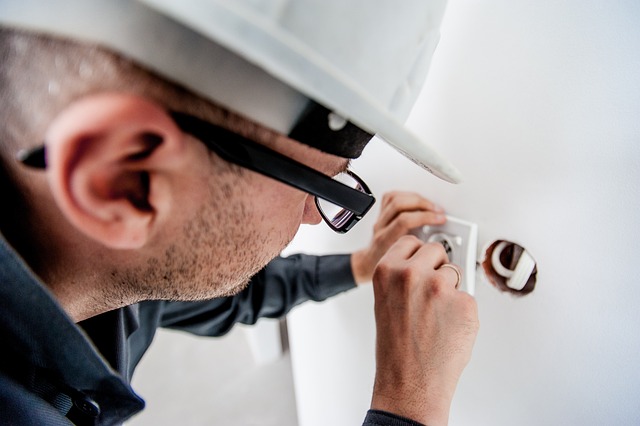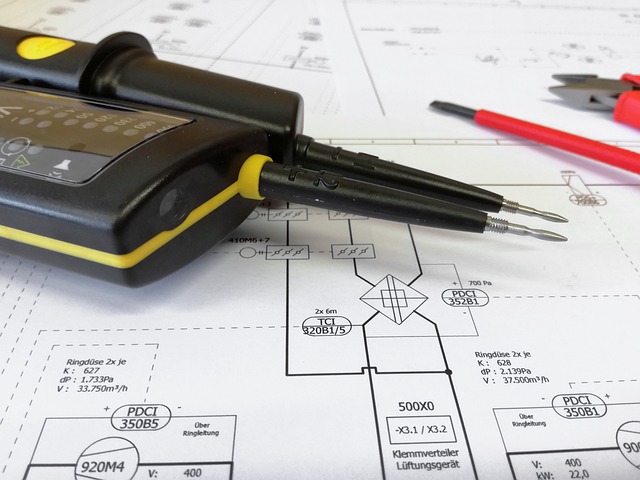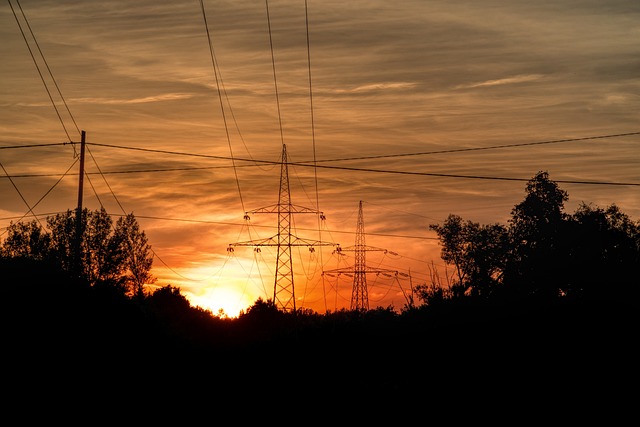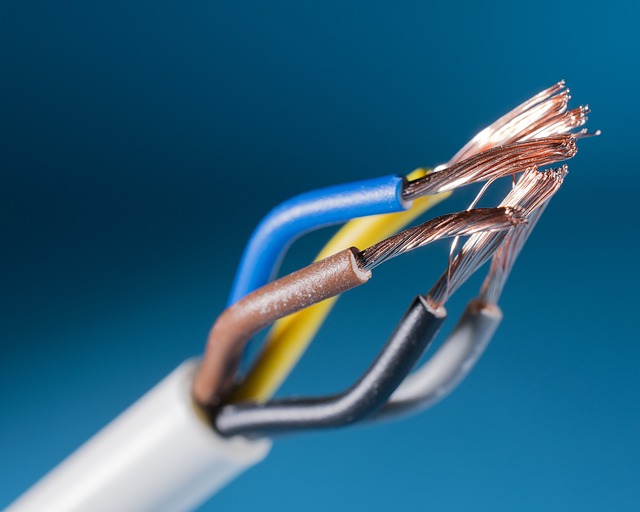Electrical inspectors play a critical role in ensuring the safety and compliance of buildings with electrical codes by collaborating closely with electricians. These experts conduct thorough inspections of all electrical systems in residential, commercial, and industrial settings, including service drop or service entrance cables, service panels, distribution boards, and grounding systems. They verify that installations meet local and national regulations, identify potential risks such as substandard wiring and insufficient surge protection, and ensure the use of safety devices like Ground Fault Interrupters (GFIs) in necessary areas. The inspectors' meticulous work is essential for preventing electrical hazards that could lead to malfunctions, fires, or shocks, and for updating or replacing outdated components in aging infrastructure. Through regular inspections, electricians ensure the adherence of buildings to safety standards, protect occupants, and avoid legal issues related to non-compliance. The proactive oversight by electrical inspectors underscores the importance of staying current with safety standards and practices, contributing significantly to public safety and the integrity of the built environment.
Building safety is paramount, intertwining with legal requirements to ensure structures meet stringent codes. Electrical inspectors play a pivotal role in this process, verifying compliance and identifying potential hazards within buildings. This article delves into the essential responsibilities of these professionals, emphasizing the importance of regular inspections conducted by qualified electricians. We will explore key components and systems scrutinized during an inspection, the collaborative efforts with other industry experts to maintain building integrity, and the overarching goal of safeguarding occupants and properties. Understanding these aspects is crucial for recognizing the significance of electrical compliance in the built environment.
- Understanding the Role of Electrical Inspectors in Ensuring Building Code Compliance
- The Necessity of Periodic Electrical Inspections for Safety and Legal Adherence
- Key Electrical Components and Systems to Examine During an Inspection
- How Electrical Inspectors Collaborate with Other Professionals to Maintain Building Integrity and Safety
Understanding the Role of Electrical Inspectors in Ensuring Building Code Compliance

Electrical inspectors play a pivotal role in maintaining the safety and integrity of buildings by ensuring compliance with established electrical codes. These professionals are tasked with verifying that all electrical installations, from residential homes to commercial structures, meet the stringent standards set forth by local and national regulations. Their expertise is crucial in identifying potential hazards such as faulty wiring, improper grounding, and inadequate protection against electrical surges. By conducting thorough inspections at various stages of construction or renovation, electrical inspectors collaborate closely with electricians to ensure that all systems are functioning correctly, pose no safety risks, and comply with the intricate details of building codes. Their diligence not only safeguards the inhabitants but also protects property from damage due to electrical failures. Through their meticulous work, they contribute significantly to the overall safety and functionality of buildings, ensuring that electricians’ installations are both safe and up to code.
The Necessity of Periodic Electrical Inspections for Safety and Legal Adherence

Regular electrical inspections are a cornerstone in maintaining safe and compliant buildings. An electrician plays a pivotal role in this process, meticulously examining the electrical systems to ensure they adhere to current codes and standards. These inspections are not merely precautionary measures but are legally mandated in many jurisdictions to safeguard occupants and property from potential electrical hazards. Over time, electrical components can degrade or become obsolete due to technological advancements, increasing the risk of malfunctions, fires, or shocks. An electrician’s expertise is crucial in identifying such risks and implementing corrective actions. These professionals are equipped with the knowledge and tools necessary to verify that all installations comply with local regulations, including wiring, grounding, and proper usage of electrical devices. By conducting these inspections at regular intervals, building owners can rest assured that their properties are up to code, thereby preventing potential tragedies and avoiding legal repercussions associated with non-compliance. It is a proactive approach that underscores the importance of professional oversight in the ever-evolving landscape of electrical safety standards.
Key Electrical Components and Systems to Examine During an Inspection

When an electrician conducts an inspection for code compliance and safety risks within buildings, they meticulously examine key electrical components and systems that are critical to the structure’s functionality and occupant safety. A fundamental aspect of this process is evaluating the service drop or service entrance cables, which include the primary power lines leading into the building from the street or pole. These cables must be properly sized, insulated, and secured to ensure they can handle the electrical load without overheating or presenting a hazard.
Furthermore, the electrician will inspect the service panel or distribution board, where all circuits converge. Here, they assess the condition of circuit breakers or fuses, ensuring each one operates correctly and is rated appropriately for the circuit it protects. The presence of modern safety features such as Ground Fault Interrupters (GFIs) in areas prone to moisture, like bathrooms and kitchens, is also a key indicator of up-to-date compliance with safety standards. Additionally, the electrician checks the condition of all visible wiring, looking for signs of wear, overheating, or improper installation. This includes both the branch circuits supplying individual outlets and the feeder and sub-feeders that distribute power throughout the building. The electrician ensures that all conductors are up to code, including the grounding system, which is essential for protecting against electrical surges and preventing shock hazards.
How Electrical Inspectors Collaborate with Other Professionals to Maintain Building Integrity and Safety

Electrical inspectors play a pivotal role in ensuring that buildings adhere to electrical codes and maintain integrity and safety. Their collaboration with electrical contractors and engineers is integral to this process. Electrical contractors, often known as electricians, are involved in the installation and maintenance of electrical systems. Inspectors work closely with these professionals to review their designs and plans for compliance with national electrical codes. This synergy ensures that the proposed installations are safe and up to code, preventing potential hazards such as overloaded circuits or improper grounding. During construction, inspectors may make on-site inspections at various stages of the project, from rough-in to the final inspection before occupancy. At each stage, they provide feedback to the electricians, guiding them towards adherence with safety standards and ensuring that the building’s electrical infrastructure is both functional and secure. This ongoing dialogue and cooperation are essential in maintaining a safe environment for future residents or users of the building. The partnership between electrical inspectors and electricians not only helps in detecting potential issues early but also fosters a culture of safety awareness within the construction industry. By pooling their expertise, they uphold the highest standards of electrical safety and integrity in buildings, which is a cornerstone of public well-being and trust in the built environment.
In conclusion, the role of electrical inspectors in maintaining building code compliance and ensuring safety within structures is multifaceted and indispensable. These professionals, often working alongside electricians, meticulously assess various electrical components and systems to safeguard occupant well-being and adherence to legal standards. Regular inspections are not just a legal mandate but an integral part of risk management for any building. By leveraging their expertise, these inspectors contribute significantly to the overall integrity and safety of our built environments. It is through their diligence that we can rest assured that our homes, workplaces, and public spaces remain compliant with electrical codes and free from the hidden dangers that can arise from outdated or improperly installed electrical systems.
